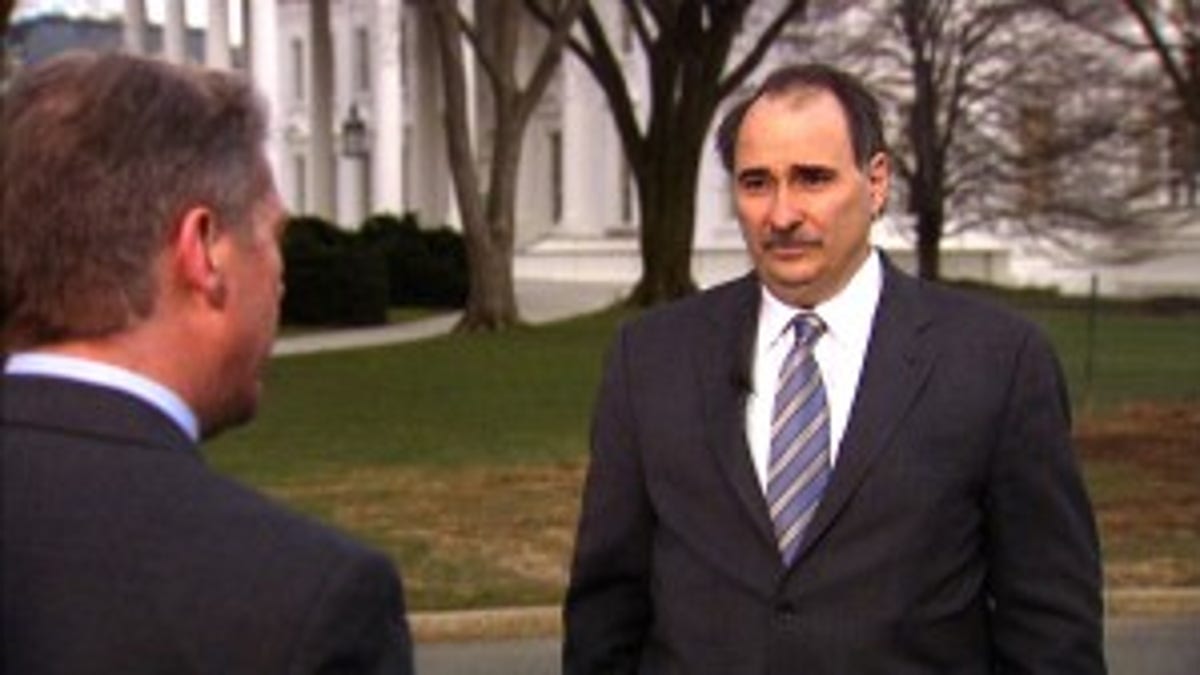
David Axelrod from Garrett Interview 2/25/10
President Obama will "contemplate" GOP ideas introduced at today's health care summit but would not guarantee embracing them or asking Democrats to insert them in still-developing health care legislation, Senior White House Adviser David Alexrod told Fox
Axelrod also refused the rule out using procedural tactics to move health care through the Senate on with a 51-vote majority, a maneuver Obama himself implied was coming if a grand compromise is not reached in the coming weeks.
Lastly, Axelrod ruled out starting the health care debate from scratch and did not rule out the possibility, though it appears remote presently, of settling for a scaled-down and far less expensive version of health care reform.
On Republican ideas, Axelrod attached several qualifiers to how White House support might or might not translate into legislative action. When asked specifically how GOP ideas might make their way into a bill Obama would sign, Axelrod said:
"That's what the President's going to contemplate. He's going to look at the ideas that were discussed today. There were some that he expressed an interest in exploring. He is going to see if those can help enhance the proposal that he's made, consider the alternatives and move forward."
On specifics, Axelrod said Obama's prepared to look at insurance pools for small businesses so that "people who don't have insurance through their employer can get insurance at a competitive rate." Axelrod also said Obama will look at GOP ideas on expanding preventative care.
Significantly, Axelrod said Obama was open to changes on the issue of allowing insurers to compete across state lines - a key GOP request.
"The President believes in promoting competition. We have in our proposal an idea that was borrowed from Governor Pawlenty that compacts between states so that insurance companies can sell across state lines with states that are in compacts. There were folks on the republican side that said 'No, we want to do this on a national basis.' What the president said is we need to have some minimal standards so insurance companies aren't exploiting their customers. But he's willing to explore that, particularly when we have a (health insurance) exchange up where people can, where insurance companies can compete within the exchange. That's going to take care of some of these standards issues."
Conceding these ideas are not yet in pending House and Senate bills, at least as defined by Republicans, Axelrod rejected GOP calls to scrap existing legislation. He also struggled to explain how congressional Democrats would include them in any bill likely to reach Obama's desk.
"Rewriting is kind of a canard," Axelrod said. "All the ideas are on the table and have been for some time. This has been a long, long process and both sides have sets of ideas. The President expressed an interest in some of the ideas that he heard today that could enhance the proposal that he's made. He'll go back, contemplate that and decide how to move forward."
As for a slimmed down, Plan B on health care, White House officials have acknowledged one exists but say it's not where Obama is as he charts an uncertain way forward. Officials told Fox Obama ordered up a plan that would cover about 15 million people about a quarter of the cost of current plans (estimated at approximately $1 trillion over 10 years). The essential ingredients would allow parents to use their insurance coverage for their children up to age 26 and expand coverage under Medicaid and the Children's Health Insurance Program, both state-federal health care partnerships.
"I'm not going to discuss tactics," Axelrod said when asked about Plan B. "Our plan is to do deal with a very big problem facing this country in the ways that make sense and a lot of thought has been put into this. Time is of the essence and we want to move with all due speed to bring this to a conclusion."
Axelrod sidestepped whether Obama was willing to green light a procedural maneuver around the Senate's traditional 60-vote filibuster.
"I'm not going to get into the tactics or the procedures. "The American people, I think, want a straight up vote on this. They don't want procedural games. They want a majority vote on this one way or the other and hopefully we can, we can get that done."
When reminded House Democrats have said they don't have the votes to pass the Senate health care bill and that is the necessary prelude to any procedural maneuvering ahead of a 51-vote Senate strategy, Axelrod admitted many obstacles remain.
"There are a number of issues," Axelrod sighed.
Echoing House and Senate Democrats who recoiled at the suggestion of a scaled-back version of health care, Axelrod said incrementalism is to be avoided.
"One thing that was clear from this conversation today is that there are certain things that you can't do on a piecemeal basis," Axelrod said.
In this regard, Axelrod expressed thinly-veiled skepticism at GOP expressions of concern about the uninsured and small businesses struggling to obtain coverage for their employees.
"Everyone says we have great solicitude for people with preexisting conditions who are excluded from insurance today but the fact is and every expert agrees this, that you can't really deal with that unless you deal with a comprehensive, a comprehensive solution," Axelrod said. "Everybody expresses solicitude for small businesses and people in the individual market but what the President's proposed is the largest tax cut for health care ever aimed at small businesses and those people in the individual market, middle class people to help them afford insurance in additional to that pooling we talked about before. This is a large problem and it requires a thoughtful comprehensive solution."
:




